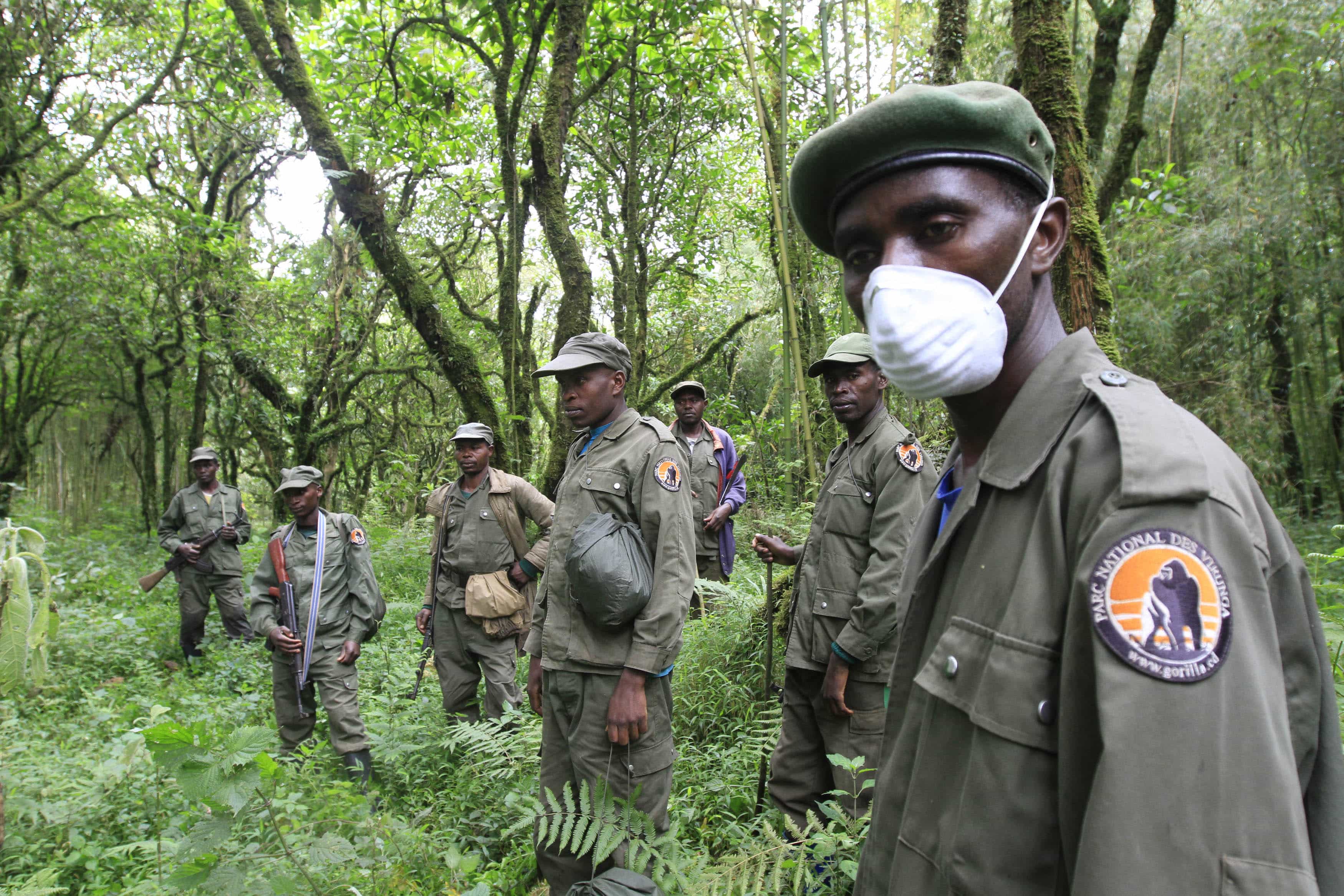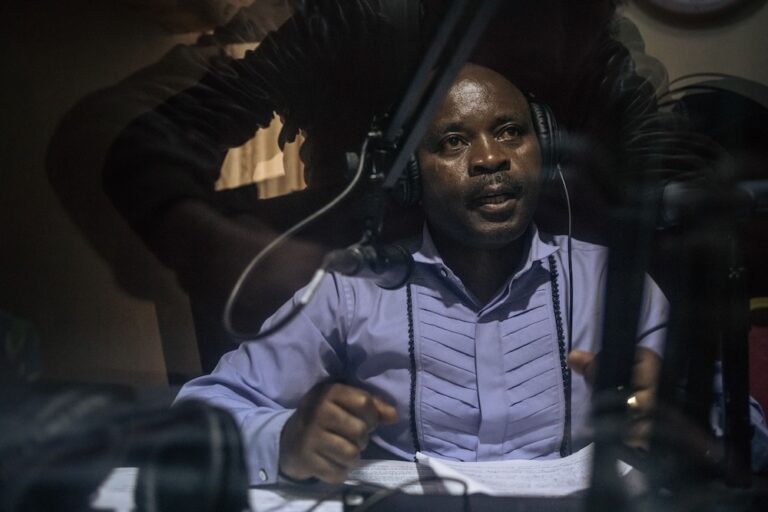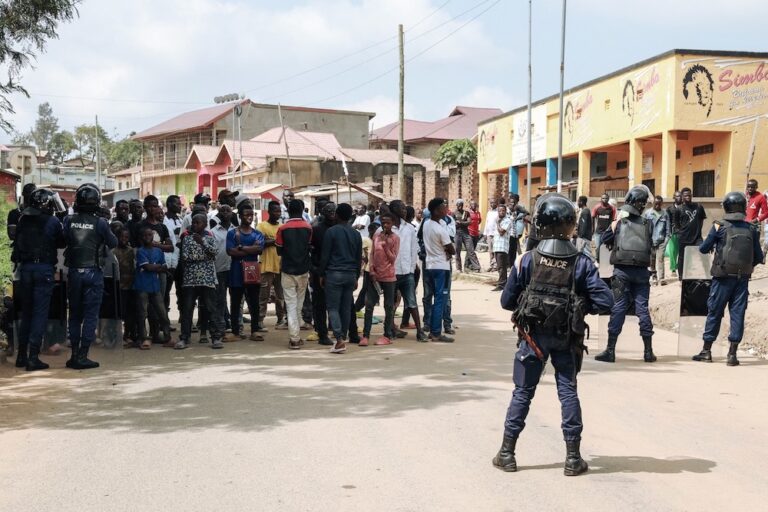Several rangers and activists have been arbitrarily detained by the authorities and threatened or assaulted by unidentified people after criticizing plans for oil exploration in Virunga, a UNESCO world heritage site.
Democratic Republic of Congo authorities should fully and impartially investigate threats and violence against Virunga National Park rangers and local activists, said Human Rights Watch. The government should examine whether the incidents are linked to plans to explore for oil within and near Virunga Park by SOCO International, a British oil company operating in eastern Congo.
Several rangers and activists have been arbitrarily detained by the authorities and threatened or assaulted by unidentified people after criticizing plans for oil exploration in Virunga, a UNESCO world heritage site that is home to many of the last surviving mountain gorillas. On April 15, 2014, armed men shot and seriously wounded the park’s director, Emmanuel de Mérode, a Belgian national. Congolese military justice officials and police have opened an investigation into the attack.
“The attack on the national park’s director was a painful and shocking reminder that people working to protect Africa’s oldest park – its habitat, wildlife, and local communities – do so at enormous risk,” said Ida Sawyer, senior Congo researcher at Human Rights Watch. “Congolese authorities need to make sure that those responsible for this attack and others are arrested and prosecuted.”
The Belgian federal prosecutor should also consider opening an investigation into the attack on the basis that de Mérode is a Belgian national. The Belgian and Congolese judicial authorities could join efforts to strengthen the investigation.
De Mérode and other park rangers, activists, and local community members have long criticized proposed oil exploration and drilling in the park, which they contend will have a negative impact on the park, its wildlife, and local communities. SOCO International signed a production-sharing contract with the Congolese government in 2006 to explore for oil within and near Virunga Park. In October 2011, SOCO received a permit to explore for oil in Block V, a vast area in eastern Congo, of which 52 percent lies within Virunga Park, next to the endangered gorilla habitat.
De Mérode and other rangers have asserted that SOCO’s activities in the park violate Congolese and international law, which, as government officials, the rangers say they have a duty to uphold. Other Congolese government officials in Kinshasa and eastern Congo support SOCO’s plans, given the potentially large financial gains oil would bring.
SOCO has denied any role in threats, violence, or bribery, but has said it will look into allegations of bribery, and condemned the use of violence and intimidation.
In the week following the attack on de Mérode, at least three human rights and environmental activists received threatening text messages from unidentified numbers, Human Rights Watch said. One message said:
“You are playing with fire [name of activist], you are going to burn your second leg, it’s useless to change your car because we know all the cars and we’re everywhere you go with your team. Don’t believe that just because we failed to get your director that we are going to fail to get you.”
Another message said: “You think that by writing you’re going to prevent us from extracting oil. You are going to die for nothing like de Mérode.”
On May 3, 2014, an environmental activist in Goma received three calls from an unknown number. The caller threatened the activist, saying that they “wanted the head” of a staff member of the organization who, the caller said, had bad-mouthed their interests. The caller said: “We failed to get de Mérode, but we won’t fail to get [name of staff].” They told the employee that if he told anyone about the calls, he would be “dealt with.”
“Park rangers and activists should be able to oppose oil exploration in Virunga Park without risking their lives,” Sawyer said. “Congolese authorities need to take steps immediately to make sure that people are safe when they try to uphold the law, protect the park, and peacefully express their views.”
Victims of abuses and witnesses to these incidents allege that Congolese government, military, and intelligence officials who support oil exploration in the park were responsible for previous threats and acts of violence against activists and park staff.
Activists and park rangers alleged that SOCO representatives and security contractors attempted to bribe them to gain their support or to discourage them from speaking out against oil exploration in the park and to facilitate the company’s activities in the park. One environmental activist alleged that SOCO representatives offered him US$20,000 and told him he would be able to hire five people to work for him if he accepted the money.
An investigation by park authorities found that a SOCO representative paid a senior park official several thousand dollars over several months to support SOCO’s activities. The official participated in meetings with park rangers at which they were told that they would be fired if they did not support SOCO. Findings from this investigation, which lasted over three years, were submitted to a Congolese prosecutor in Goma on April 15, hours before the attack on de Mérode.
In a meeting with Human Rights Watch on May 23, North Kivu Governor Julien Paluku acknowledged that certain government and security officials seem to have been “manipulated.” He said that he did not know who was manipulating them, but that it appeared they had been paid and “instrumentalized” to support oil exploration. He said there had been numerous allegations about threats and assaults against activists and park rangers opposed to oil exploration, and that he had asked the police and military justice officials to investigate.
In a May 30 response to a letter from Human Rights Watch regarding allegations that SOCO representatives were involved in bribery, SOCO’s Deputy Chief Executive Roger Cagle wrote:
There have been a substantial number of false and inaccurate allegations levelled against SOCO International plc in recent years and particularly in the last month. Sadly, a number of these allegations have arisen as a result of inaccurate, false, distorted and/or exaggerated accounts of our activities in the Democratic Republic of Congo (the ‘DRC’). It also increasingly seems to be the case that anyone engaging in alleged questionable and unethical conduct are immediately branded ‘SOCO representatives’ and ‘SOCO supporters’ even when they simply are not and have nothing to do with our company. …
We operate on a strict Code of Business Conduct and Ethics (our “Code”). …We are fully committed to conducting our business in an honest and ethical manner and we expect and require that our contractors, suppliers and agents will conduct themselves in the same manner. Moreover, the Company operates in accordance with the UK Bribery Act 2010 and as part of our required Bribery Risk Governance, we have a formal process to mitigate risks of corruption.
Regarding the specific allegations of bribery raised by Human Rights Watch, Cagle wrote that company officials “have no information as to whether or not the incidents actually took place, and if so, what happened. However, based on the information available, we have instigated the procedures in our code.”
SOCO should act in accordance with the Voluntary Principles on Security and Human Rights, international guidelines that place responsibilities on companies to take specific steps to safeguard rights whenever they rely on public or private security forces to guard their operations, Human Rights Watch said. In addition, the company should adhere to the United Nations Guiding Principles on Business and Human Rights, which call on all companies to identify any possible human rights risks in their operations and address any problems that might occur.
Human Rights Watch urged the British government to investigate SOCO’s activities in eastern Congo under the United Kingdom’s Bribery Act. Any inquiry should examine alleged acts of corruption or bribery that may have led to attacks and threats against park rangers and activists.
“The allegations that SOCO representatives offered bribes in the volatile climate in Virunga Park should be taken seriously,” Sawyer said. “SOCO should investigate their representatives, agents, and contractors and make sure that none are involved in harassment of activists and park personnel.”
Click here to read the rest of the report on the Human Rights Watch website.



